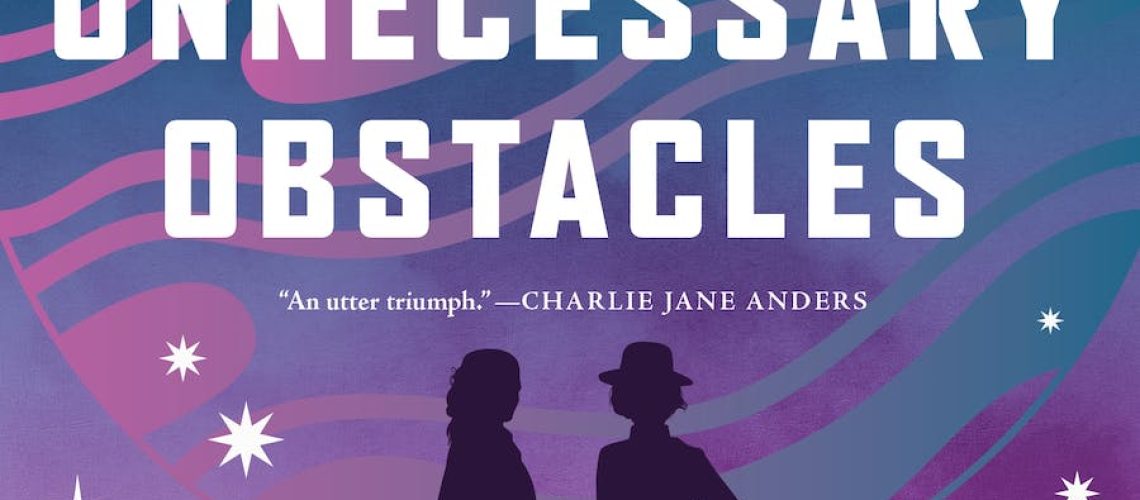I greatly enjoyed Malka Older’s The Mimicking of Known Successes in 2023, and reviewed it very favorably in the fall, after the revival of the Skiffy and Fanty blog. I thought the worldbuilding was incredibly interesting (Earth climate collapse refugees on Jupiter, with a sort of upper-atmosphere railway system around the planet), and I really enjoyed the tentative romantic reconnection between detective Mossa and academic Pleiti as they solved a cozy space-opera mystery together. So naturally, I was very excited to get an Advanced Reader Copy of the sequel, The Imposition of Unnecessary Obstacles, which is available for preorder now and will be released on Feb. 13.

The Imposition of Unnecessary Obstacles is an enjoyable continuation of The Investigations of Mossa and Pleiti, as the series is called. I didn’t find it as striking as the original, being already acquainted with the world and the characters, but that may have been hard to avoid. Happily, for anyone who longs to return to the gas-fire rooms and dumbwaiter-delivered scones, the academic bureaucracy, the ecological speculations, the journeys, and perhaps most of all, the intermittent, somewhat difficult but definitely rewarding relationship of the first book, this one should also be rewarding.
Mossa turns back up at Pleiti’s quarters at Valdegeld University with a disturbing discovery: At least 17 students and staff members have disappeared fairly recently, quietly and individually, so that nobody has noticed it until now. Although Mossa started the investigation on her own, she asks for Pleiti’s help, partly to navigate academia, and partly, as Mossa admits, just to spend more time with Pleiti.
It’s interesting that in the first book, we heard a lot more of Pleiti’s uncertainties about their relationship, and in this one, considerably more is revealed about Mossa’s own tentativeness. Partly, she’s concerned about interfering with Pleiti’s career, and she has some justification for that, as Pleiti has had some difficulty focusing on her academic work (researching past literature to help build templates for restoring the Earth’s ecology) since their prior adventure. She’s had some doubts whether the main research is really going in the right direction, and is branching off on some side projects, and she begs off from her tutorial responsibilities without much compunction when Mossa offers that opportunity.
I think the series will lose some valuable elements in future books if Pleiti quits her university job and just becomes another investigator with Mossa. I enjoy the scientific musings and the academic world. However, this book shows there’s plenty more to explore if Older does take that direction; Pleiti and Mossa visit a settlement on Jupiter’s moon Io, although there’s no time to meet up with Mossa’s kin there, and other strange places are referenced; also, opposing philosophies and worldviews are given some space. And it’s certainly interesting to watch Pleiti struggling with the meaning of her work; hopefully a future book will bring this into a better resolution for her.
I didn’t think the mystery was quite as well crafted in this story as in the first book, which came together in a really satisfying way. It’s fine that the plot has some major red herrings, but the solution at the end felt more like it was just time to wrap up the ending than something that wove story-long threads into any kind of a neat bow.
I was also pulled out of the story a little bit by one scene where Mossa and Pleiti are questioning some relatives of a missing student, and Mossa introduces Pleiti as her “copine and colleague” – I believe “copine” can be translated as girlfriend, or maybe lover, which is borne out by the ensuing argument over what a settler argues is their responsibility to help grow the population. Nowhere else in either book does Mossa introduce Pleiti to strangers using such a personal term – in fact, it seemed to me to undermine Pleiti’s presence in that conversation – and it felt a bit jarring.
However, neither that short scene nor the slightly less satisfying conclusion here are reasons to skip this book; there’s a lot besides those elements to relish here. If you loved The Mimicking of Known Successes, you will almost certainly find pleasure in The Imposition of Unnecessary Obstacles too. However; I do NOT recommend diving into the series by starting with this second book; the worldbuilding and character development in the first book are necessary to get the full enjoyment out of the second.
Content Warnings: Violence, death, references to past environmental catastrophes.
Disclaimer: I received a free review copy of this book from the publisher.







